
A lot of bitcoin for beginner articles focus on what bitcoin is, and how it works, but I want to take a different angle. I want you to know why bitcoin is important to your life.
Do you need it?
Can you make money with it?
Why is this thing such a big freakin’ deal?
Learning about bitcoin is difficult, and can take some time to wrap your head around the concepts. Even PhD economists and billionaire tech entrepreneurs don’t understand bitcoin, so don’t expect to fully grasp what’s going on after reading a single article
What I hope to achieve here is to help you understand why bitcoin is important, and why you should probably own at least a little bit. Of course, I’ll point to follow up resources, but this isn’t meant to be a guide to turn you into a super-coder-crypto-investor-bitcoin-expert. This beginners guide is just meant to get a basic understanding of just the important things.
Bitcoin is complicated, and it’ll take more than 15 minutes to fully understand, but this beginners guide to bitcoin is going to tell you what you need to know for now, then point you where to go next.
Start Here! What Does Bitcoin Do?

As a beginner, before you even get some bitcoin, I think it’s really important to understand what bitcoin does.
Actually, what bitcoin does is so simple that it might not seem impressive at first.
Bitcoin allows you to send digital money directly from person to person.
That’s why the subtitle of the Bitcoin Whitepaper was “A Peer-to-Peer Electronic Cash System”.
If you’re reading that thinking, who cares? You’re not alone. Most people don’t understand why p2p electronic cash is such a groundbreaking invention, I’ll explain it in one simple scenario.
Try to send money from your phone to another phone without using a company.
No PayPal. No Chase. No Zelle. No wires.
Before 2009, it couldn’t be done.
Peer-to-peer transfer in real life is simple. I have something of value (cash, gold), and I physically put it into the hand of another person. They are now the owner, and can go spend it somewhere.
Before bitcoin, you couldn’t do that in the digital world. You always need a company in the middle to facilitate the transfer.
That meant you needed permission to have an account. Accounts could then be locked or confiscated if you didn’t comply with their rules.
So what bitcoin does is pretty simple. It lets you hold money in a digital account send money directly to another person on the internet without permission from a company.
If that sounds like something that would be useful to own, then you also now know why bitcoin has value.
—- in “why bitcoin has value” section add something about fluctuating value, or is that too complicated? —- why bitcoin has value section should follow “what does bitcoin do” section. —- add something about limited number of units in the same section if it isn’t already.
Bitcoin is a strange game where the only winning move is to play.
Bitstein
Step 1: Why Does Bitcoin Have Value?
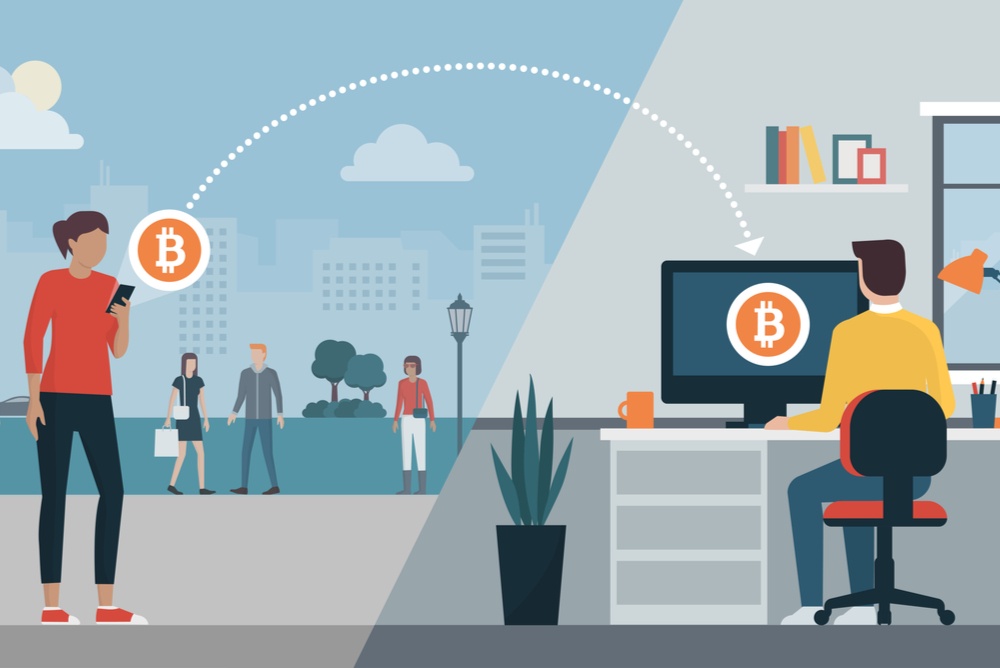
I’ve actually written a whole post about why bitcoin has value you can check out, but I’ll save you the time here and summarize my points.
- It’s money you can send over the internet directly to another person
- It’s money that can’t be debased by governments or central banks
- It’s money you can send anywhere in the world without permission from corporations
- It’s quick and cheap to clear transactions
There are more reasons bitcoin has value, but these are the main ones to keep in mind. Basically, bitcoin has value because it’s performs the functions of money better than our current fiat money. You may not realize it because you’re just used to the system we use, but there are many flaws in our current system that need to be acknowledged. Bitcoin has flaws as well (as all forms of money do), but for me, the main reason bitcoin has value is because it performs a much-needed function that other forms of money are not able to perform.
If I could distill that function down into a single idea, it’s that Bitcoin is digital money that doesn’t rely on a single corporation or government to function. When you rely on a single entity, it creates centralized control, and then you don’t have control over your own money.
With our current system, banks, tech companies, and governments get to tell you what you can or cannot do with your money. With bitcoin, there are no Terms and Conditions. There is no head office or compliance department.
Do you need Paypal’s permission to give your friend a few physical dollars to pay for lunch? No
Do you need Chase’s permission to hand over a paper dollar bill to the cashier at the grocery store? No.
The story is different online. When you use your credit card, Chase is giving you permission to pay at the grocery story. When pay with your phone, Paypal is giving you permission to transfer those funds. Banks and tech companies have created the payment rails we are all used to, but we are guests in their home. Bitcoin is different. Bitcoin is permissionless.
Bitcoin is similar to physical cash, in the sense that you are sending money to someone directly without the the interference of a third party.
You could argue that you, the reader, don’t need or value this functionality yourself, but many people around the world do. Whether or not you personally use bitcoin is irrelevant, because other people in the world do use it and place value on its functionality.
Related Content
Step 2: Why Should You Care About Bitcoin?

So bitcoin has value for some people, but you may be asking yourself “Why should I care about bitcoin?”
I can tell you a million things about this history of money or the problems caused by central banks. I could tell you that bitcoin helps dissidents in Nigeria, and “banks the unbanked” in El Salvador, but none of that is really going to be convincing if you can’t find a reason why you should own bitcoin. If you aren’t escaping a murderous tyrant in the middle of the night or finding economic shelter from a hyperinflating currency, you might still be confident that you don’t need bitcoin.
Let’s say you live in a politically stable Western country, have a consistent income, a retirement account, and some other investments. Are there still any good reasons to own bitcoin? Here are some things to consider.
1. Do you care about saving money for the future?
If you care about the future value of your money, then you need to make some decisions about where to store that value. No store of value is perfect, and each choice has tradeoffs to consider. You can be “ultra safe” in straight cash, but then you lose 2%-10% of purchasing power per year. You can invest in stocks, but your returns will be reliant on choosing a good company, in favorable market conditions. You can invest in broader market index funds for a safer version of stock investing, but you are still reliant on the US maintaining its position on the global stage, and completely reliant on interest rates and the resulting market incentives.
There are other investments to consider as well, such as real estate, but they also come with their own tradeoffs like minimum investment requirements and knowledge of the market. Unless you’re a full time investor or have the cash to pay a professional, these are not options for many investors.
Bitcoin fills an interesting role in that it can be an “outside bet” with a unique set of properties not available with other types of investments. It’s got a fixed supply, unlike dollars or other fiat currencies. It’s not a company, so it’s not reliant on revenue to generate profits to shareholders. It’s not controlled by any one central entity (corporate or government), and not subject to the monetary or fiscal policy of a single nation. You can buy as little as a few dollars, or more than a billion dollars at a time.
All that is to say, Bitcoin is different from everything else. The point of a balanced portfolio is to have a variety of assets that perform differently in varying market conditions, so why not put just 1% of your investments into something which is completely and utterly unique?
2. Are you 100% confident in the stability of the current financial system?
Lots of bitcoiners choose to hold bitcoin because they simply don’t have faith our current financial institutions to properly manage the complex economy. The global trade network of billions of people is so complex, that no single person can fully understand what’s happening at a granular level, let alone understand the future consequences that any action today might have in the future.
Yet, we have a small group of people making decisions that affect the economy, creating a butterfly effect of consequences and incentives that are impossible to accurately predict.
Are you absolutely, 100% sure that things are just going to work out because the smart people are in charge?
Personally, I prefer to have a little bit of a backup plan, AKA Plan ₿, or a hedge against the traditional financial system.
You don’t have to expect armageddon or complete financial meltdown to think that having a little bit of bitcoin backed up somewhere could be useful in the case that the “adults in the room” end up screwing things up.
Step 3: What If Bitcoin Goes To Zero?

In my experiences talking to people about bitcoin and money, I’ve realized that most people just simply do not enjoy thinking about saving, investing, or managing their money. Out of sight, out of mind. My theory is that because buying bitcoin requires a little bit of thinking outside the box and actually caring about your money, it turns people off.
The prospect of owning bitcoin is scary. What if bitcoin goes to zero and I lose all my money?
The truth is that any investment can cause you to lose money. The reason investments yield profits in the first place is because there’s risk involved. That’s literally how markets work. You cannot earn profit without taking on risk. Yes, even your “safe” mutual funds have risk of loss of capital.
So could bitcoin go to zero? Sure. It could. But how likely is it to go to zero? I think that is the more interesting question here. Remember in the beginning where we talked about bitcoin having value because it’s useful? Let’s look at those uses again.
- How likely is it that people will stop needing to send money across borders?
- How likely is it that governments will stop leveraging financial institutions to censor dissidents?
- How likely is it that private companies will stop abusing user’s balances?
- How likely is it that central banks will stop expanding the money supply, debasing the value of fiat currencies?
Keep going down the list of use cases for bitcoin, then ask yourself how likely it is that those use cases will grow or diminish in the future. Spoiler: It’s very unlikely. Therefore, Bitcoin will not just remain as useful as it is right now, it will become more useful in the future.
The bitcoin user experience will continue to improve over time. Bitcoin is decentralized, meaning there is no single point of failure. There is no “head office” or source of funds. There is no director of development or roadmap. There are thousands of people working on bitcoin or bitcoin-related projects at any given time, in every country in the world.
Furthermore, Bitcoin is permissionless, meaning there are no gatekeepers preventing anyone from using, working on, or leveraging Bitcoin. It’s hard to underestimate the power of what that means. My favorite way to understand this effect is that that Bitcoin is “additive” technology, meaning that anyone who adds to bitcoin benefits the entire network.
So what are the chances that a decentralized, permissionless technology with clear-cut use cases, suddenly becomes completely useless and every invested individual, corporation, miner, coder, and entrepreneur simultaneously gives up? Sounds pretty unlikely to me. I’m pretty confident that bitcoin is not going to zero at this point.
Step 4: How Do I Know My Bitcoin Is Safe?

OK, so you’ve decided to get some bitcoin, but you still aren’t 100% confident in how to use it properly. It’s most likely that the main thing you are focused on is how to keep it safe, since you’ve heard tons of stories about bitcoin getting stolen. So how should you store your bitcoin and know it’s safe from hackers?
Buying bitcoin is super simple. You just need to create an account on any bitcoin exchange or bitcoin app. I think one of the easiest ways to buy bitcoin for Americans is through Cash App, but there are plenty other bitcoin-only exchanges to choose from.
THE NEXT STEP IS VITAL: YOU NEED TO TAKE YOUR BITCOIN OFF THE EXCHANGE
It doesn’t have to be right now. We’re still in the beginner stage, and doing self custody with your bitcoin does involve some risks. However, it’s extremely vital to understand that if your bitcoin is on an exchange, there is a chance that at some point in the future you won’t be able to get your bitcoin.
Exchanges can go bankrupt, get hacked, or abuse user funds. A bitcoin exchange is not a bank account. People from the Mt. Gox hack of 2013 are still waiting on legal action intended to return a portion of their funds as of 2022. Anyone who had funds on Celsius during the Terra/Luna and Anchor collapse in 2022 are expecting a total loss of funds.
Bitcoin cannot go bankrupt, get hacked, or abuse user funds. When you self-custody your bitcoin, you remove the risk associated with keeping your stack on an exchange.
I’m not saying that you have to do it right now, because it does take some time to wrap your head around some basic bitcoin concepts and feel comfortable with the idea of self custody. Take the time to learn what’s going on, and how to do it right. However, my advice is to not assume that an exchange will do a better job of keeping your bitcoin safe than you.
Owning bitcoin requires a bit of responsibility, and you have to realize that leaving your coins on an exchange doesn’t absolve you of that responsibility. If they abuse your bitcoin and lose your money, then it’s still your fault, since you trusted them in the first place. So wouldn’t you rather do the work and get it done right?
There are multiple ways to interact with the bitcoin network, but in terms of keep your bitcoin stored properly, it’s pretty simple. You need a “signing device”, also known as a “hardware wallet”, and then you need to write down 12 words on a piece of paper and never show it to anyone.
Those 12 words are your “private key”, and they are what allows you to access your bitcoin. Most bitcoin hardware wallets you purchase will come with a specially labeled piece of paper and clear instructions on how to generate these words step by step, then properly store them. You should never put these words on ANY online device, including a digital notepad, screenshot, or photo. If anyone gets access to these words, they can take your bitcoin.
If you can keep these words secure, then your bitcoin is safe and secure. Simple as that. There are as many potential bitcoin private key variations as there are atoms in the universe.
You can even back up these words using custom steel plates specifically designed for bitcoin private keys so that your private key cannot be destroyed in a fire, flood, or other accident.
So how do you know your bitcoin is safe? If you have these 12 words secured privately in steel then your bitcoin is safe. There’s simply no way for anyone to get it other than you. Your seed phrase is your backup in case you lose or break your hardware signing device (hardware wallet), and you should protect this device as well.
Step 5: Beginner Bitcoin Dictionary
13 Essential Bitcoin Words

Cold Storage
Cold storage is holding your bitcoin private keys offline by using a hardware wallet, AKA “signing device”. Your bitcoin is unable to be spent without manually approving a transaction using this hardware.
Hot Wallet
A hot wallet is a bitcoin wallet which is connected to the internet and able to spend funds in real time. Examples could be a mobile wallet or browser wallet, where your private key is held on the phone or browser.
Private Key
A private key is a “key” allowing you to spend bitcoin from a wallet. This should never be revealed to anyone, and never by typed into any computer keyboard. Never store your private key in a text file on your computer, screenshot it, or have any video recordings of it. Anyone with access to your private key can spend your bitcoin.
A raw key is a string of 64 characters, but the majority of the time is written down as series of 12 or 24 common words from a predetermined list of 2048 words. This is why a private key is often called a “seed phrase”. When combined, these words can be used to regenerate your wallet to give you access to your funds.
Public Key
A public key, (xpub/ypub/zpub), is derived your private key. It does not allow spending of funds. Instead, it’s used to generate public receive addresses so that you can receive bitcoin. Your public key should be selectively shared with products or services that require generating receive addresses. Your bitcoin wallet will of course have your xpub, but another example could be exchanges that need to deposit funds into your bitcoin wallet on a regular basis. To generate a new address each time, they’d need the xpub. While the public key doesn’t allow for spending, it can reveal balances and transaction history.
Passphrase
A passphrase in bitcoin is password used to add an additional layer of security for your bitcoin wallet. A passphrase creates a “hidden wallet” in addition to the normal wallet created by your bitcoin private key. You can create many hidden passphrase wallets on a single private key.
A passphrase is chosen by the user and is never stored by the wallet. If lost, it can never be recovered by any means, and it is the sole responsibility of the user to securely store it.
The advantage of using a passphrase is that even if someone gains access to your private key, they still cannot get your bitcoin without the passphrase. The downside is that if you lose your passphrase, you, yourself cannot get your bitcoin even if you have the private key.
Pin
A pin is used by a wallet as an additional security measure to lock the device. After a certain number of failed pin attempts, your wallet can be set to wipe itself, brick itself, or lock down for additional security verification.
A pin is only used to secure a wallet. It does not provide additional security to the private key. Anyone with access to the private key can still access the bitcoin.
Sign Transaction
Signing a transaction means to approve it.
Airgapped Transaction
An airgapped transaction means to sign a bitcoin transaction without connecting to the internet. This can be done using a hardware wallet with a microSD slot or a camera for QR code scanning.
For example, a software wallet can be used to construct a transaction to send bitcoin, but to actually send it to the bitcoin network, you’d need an hardware device with the keys to approve it. Since the hardware cannot physically connect to the internet, you need to transfer data back and forth between the software and hardware via microSD or QR code.
Transaction Fee/Miner Fee
A transaction fee is a fee paid to miners as an incentive to include your transaction in a block. A higher fee results in a faster confirmation of your transaction. A lower fee means that you’ll wait in line behind the big spenders, but still get confirmed.
This is a a fee paid by any user of the bitcoin network, and not the same as the fees you pay when you buy or sell bitcoin on an exchange.
UTXO
A UTXO is like a “piece” of bitcoin, similar to a units of currency. When you receive 0.123 bitcoin, that bitcoin remains together as one unit, called a UTXO (unspent transaction output).
When you spent a portion of that bitcoin, two new UTXOs are created, the “spend” and the “change”. For example, if you spend 0.023 bitcoin from the original amount, two UTXOs in the amounts of 0.023 bitcoin (spend) and 0.1 bitcoin (change)…minus any fees. I just used round numbers for the example.
Understanding what a UTXO is isn’t super important to beginners, but is one concept that can be useful for spending bitcoin privately and cheaply in the future.
For example, receive one large deposit of bitcoin into your wallet of 0.1 BTC (one big UTXO) can be advantageous to receiving 10 small deposits of 0.01 BTC. A single UTXO be cheaper to spend in the future, since combining multiple UTXOs cost more to spend. However, multiple unlinked UTXOs means that you can spend your bitcoin privately, assuming the UTXO histories are not linked.
Bitcoin Exchange
An exchange is a company where you can buy/sell and sometimes lend/borrow bitcoin.
Sats
Sats are the smallest unit of bitcoin (0.00000001 BTC). Since most people don’t transact in large amounts for everyday items, it can be more convenient and easier to understand when something is price in sats rather than bitcoin.
It’s easy to compare two similar items that cost 112,000 versus 89,000 sats as compared to writing out the cost as 0.000112 versus 0.000089. How many zeros are after the decimal? How many trailing zeros are there?
Lightning
Lightning is known as a “second layer” to bitcoin, and is a way of transacting with bitcoin using faster and cheaper technology. How lightning works under the hood and how to operate a lighting wallet efficiently is pretty technical, but once you get it working, you can send and receive bitcoin almost instantly rather than waiting 30 minutes for final settlement and the cost to use the network drops to fractions of a penny (near free in come cases).
Lighting is still in the early stages of development, but many bitcoiners are excited about it and actively using the technology to send small amounts of bitcoin over social media applications like Nester and Podcasting 2.0.
What You Need To Know About Bitcoin Mining
As a beginner, do you need to know anything about bitcoin mining? Not really. So I’ll make this section short. You can pretty much go about your day without learning much about bitcoin mining, with the exception of one simple thing:
You’ll be paying some fees to bitcoin miners to transfer bitcoin. The miners mine “blocks” that contain transactions. Mining fees are the cost of using the network. When more people want to use bitcoin, competition to get into block heats up, and miner fees go up. It’s like Uber surge pricing.
The majority of the time fees are quite cheap, but during bull runs fees can get expensive. There are way to check the current fee rate, but your wallet or exchange should give you some options as to how fast you want your transaction to go through (faster = more expensive, slower = cheaper).
How To Buy & Secure Your Bitcoin
Now that you know the beginner-level overview of why bitcoin has value, the next step will be to buy and secure some bitcoin for yourself. Buying and securing bitcoin can be as simple, or as complicated as you make. For beginners, I think we can break down the process into three basic concepts, and you can dig deeper as you gain interest (or simply memorize these three steps really well).
Step 1: Get A Bitcoin Wallet
Before you actually buy your bitcoin, I recommend getting a wallet. There are mobile wallets apps that you can install right on your phone, and hardware wallets which are a 1-2 inch physical device specifically designed to secure your bitcoin. There are advantages and disadvantages to both.
Popular Hardware Wallets
Popular bitcoin hardware wallets include Ledger, Passport, Trezor, BitBox, Blockstream Jade, and Coldcard. There are more hardware wallets out there, but these are some of the longest running, most trusted brands. I highly recommend NOT buying something random because it’s cheap or you think it’s unique-looking. There are many off-brand wallets that have been proven to be insecure and put your bitcoin at risk!
The benefit to a hardware wallet is that you know your “keys” are always securely kept offline, and you can physically secure your device in a home safe or other secure hiding place. The downside is that you need to learn how to use the piece of hardware, you need to memorize/secure a pin number, and you need a secure hiding place for the device.
Popular Mobile Wallets
There are tons of bitcoin mobile wallets available that offer a variety of features for both beginner and advanced users. Key generation on mobile wallets are no different than on hardware wallets, so your bitcoin is just as secure as with a hardware wallet. Popular mobile wallets for bitcoin include Blue Wallet, Green Wallet, Phoenix Wallet, Nunchuk, Muun, but there are many more.
Something to note about mobile wallets is that some are “lightning” enabled, or even “lightning first” wallets, meaning you can spend lightning bitcoin. This is the same as normal bitcoin, but secured and spent in a different way that makes it faster and cheaper. Of course, everything comes with tradeoffs, and understanding lightning can be complicated. Understanding the difference between lightning bitcoin and on-chain bitcoin is beyond the scope of this article, but just be aware that this is an option.
The benefit of a mobile bitcoin wallet is that apps super easy to get started with. With an app, you already know how to use your bitcoin wallet! Because your wallet is on your phone, you also have your bitcoin on you at all times, and you can use your bitcoin for spending on goods or services without extra steps.
There are lots of downsides though, including that your bitcoin wallet is always online thanks to data services and wifi, and there’s a much greater chance of your phone being physically compromised or lost since you have it on you 24/7. This could be both by accident (kids playing with your phone), or from a malicious attack (robbed, catfished)
The Wallet Setup Proven To Work
Because no wallet setup is perfect, it will be important for you to choose something that works for you. There are many ways to secure your bitcoin beyond what I’ve introduce here, including multisig, collaborative custody, hidden passphrase wallets, and more. I’ve got a full list of the best wallets for beginners you should really check out.
One really sensible way to secure your bitcoin is to use a hardware wallet for your “main stack” of bitcoin, i.e. long term savings account, and a mobile wallet for your bitcoin meant to be spent. This allows you to save larger amounts of bitcoin in way that’s much harder for you or anyone else to move, while also allowing you to experience the power of sending money peer-2-peer with other bitcoiners.
Mastering Your Bitcoin Wallet In 5 Steps

There are many different bitcoin wallets to choose from. I’ll write the next five steps in a generic kind of way so that you can get the idea of what’s going to happen when you set up your wallet for the first time, but you should follow a specific guide for the wallet you choose.
1. Choose A Bitcoin Wallet
If you’re using a mobile wallet app on your phone, then the only step here is to download the app to your phone. Some wallets may prompt you to submit an email address, or you may have the option to turn on 2 Factor Authentication.
With hardware wallets, you will probably be prompted to update the firmware. I recommend updating to the most recent firmware there may be important security updates, user experience improvements, and new features.
Because hardware wallets do not connect the internet, you will either need to update the firmware in one of three ways: microSD card to download the file, connecting to a wallet companion app, or downloading the update to directly from the website. For example, with Jade you can update the firmware by connecting to the Green Wallet app via Bluetooth or by connecting your wallet to a USB port then getting the newest firmware from the Blockstream website. With SeedSigner you’ll need to update via microSD (only option), and with Trezor you’ll need to do this via the Trezor Suite desktop app.
As part of the initial setup process, you may need to set up a pin as well. A pin protect the hardware wallet or unlocks the app. A pin does not protect your private key.
2. Generate Your Private Key (And Back It Up)
To create your bitcoin wallet, you’ll need to generate the “private key”. It’s incredibly important that you do this in a private way. That means do not take a screenshot or copy paste your 12-24 words. Do not save them to a text file. I recommend even being aware of any cameras or other people in your area if you’re in a public place. Maybe even put a post-it note over your laptop camera. Anyone with access to these words will be able to access your funds.
With a hardware wallet, since the screen is small, you may be give 1-3 words at a time and asked to write them down. With a mobile wallet, you may be able to see all 12-24 at one time. Some wallets will go through an additional verification process, asking you to confirm your seed phrase by correctly selecting the some (or all) of the words in the correct order.
Your private key should be written down in clean, legible handwriting. You may want to laminate the card or paper if you have a laminating machine. Many bitcoiners eventually etch or stamp their key into steel, and there are many products on the market that make this easy.
Even if you lose or destroy the wallet or app, your funds can still be restored by putting your private key into a new wallet.
3. Generate A Receive Address
Once your key is generated and backed up, it’s time to receive some bitcoin. This part should be pretty simple. If you’re using a mobile wallet, there should be a big fat button somewhere titled “Receive”, “Receive Bitcoin, or “Generate Receive Address”. You do not have a single receive address. Every time you receive bitcoin, your wallet will create a new receive address. Though you can reuse addresses, it’s not recommended for security and privacy.
In 2023, it’s likely that this address starts with a bc1q, then followed by a long string of numbers and letters. However, there are other address types as well, including addresses that start with “1”, “3”, and “bc1p”.
Unfortunately, your wallet might confuse you and ask you what type of address you want to use. This is a major confusion point for beginners, and I hate that wallets do this. If you have to make a choice, look for the option that says “native segwit” or “pay to witness public key hash (P2WPKH)”. Your bitcoin addresses should be starting with bc1q.
Depending on the wallet, you may be able to see the entire address, or they may show you a portion of the beginning and the end. An address with 42 characters is quite long, and you won’t be expected to memorize it or even temporarily remember it. You can copy this address to the clipboard of your phone or computer, as it won’t leak any private information or compromise your funds. You can even text it to someone, send it over email, or airdrop it.
4. Send A Small Amount Of Test Funds
Let’s back up a bit. You actually need to buy some bitcoin! If you already have a bitcoin exchange account, you can send a “small” bit of bitcoin to your first bitcoin address just to make sure everything goes smoothly. If you don’t have an exchange account yet, Cash App is quite quick for buying bitcoin, and you can buy as little as a few dollars.
I say “small” amount, because you want to send more than $1. Maybe $20 or $100 worth of bitcoin. Remember that you’re paying fees to use the bitcoin network, so if you send 3,000 sats and your fees are 1500 sats, you’re paying 50% in fees, which is quite expensive! Sending 100,000 sats for 1500 sats in fees is quite cheap though (1.5%), and as of August 2023, 30,000 sats is only $28.
- Copy the receive address from your bitcoin wallet
- Go to “Send Bitcoin” or similar option on your exchange website/app
- Paste in the address you copied to your wallet
- Double check the first 3-4 characters after the bc1q in addition the last 3-4 characters
- Choose your fee rate
- Hit send!
Now it’s time to wait for the network to do its thing. If you chose a faster transaction time and paid a higher fee rate, then your wallet may receive confirmation of funds within 20-30 minutes. In fact, you may see a pending transaction in your wallet with 0 confirmations within 1-2 minutes!
If you chose a lower fee rate, you might have to wait a day or two to confirm.
For this initial test transaction, I recommend setting a higher fee rate just so you get get it done and move on to the next step. It may be the difference between spending $1 or $2 on fees, but what’s your time worth?
Once the funds hit somewhere between 3 and 6 “confirmations” (blocks) in your wallet, you’ve officially received your bitcoin and can keep it there or send it anywhere you like.
5. Wipe Wallet And Restore From Seed
Before you send the rest of your funds to your bitcoin wallet, let’s do something scary but necessary. We’re going prove that you can restore your bitcoin in a catastrophic scenario. Though you may be risking your $20 or whatever test funds you initially sent to the wallet, you’ll be much be able to sleep at night knowing you can restore your entire stack if something happens to your wallet.
First, double check you have backed up your seed phrase and can properly read all the words. If your wallet prompted you to create an encrypted backup and that’s all you have, snoop around and make sure you have your seed phrase. Encrypted backups are nice, but the seed (private key) is really what you want for ultimate safety.
Then, let’s wipe your wallet. Delete it. Restore it to factory settings.
The next time you open the wallet, it should prompt you if you want to create a new wallet or restore an old wallet. We’re going to restore it.
If your wallet asked you to create an encrypted backup, you can practice with that later, but let’s restore it from the seed.
The wallet should prompt you to enter the 12-24 words. DO NOT type them into the computer. It’s kind of a pain in the ass on some wallets to select letters and find the words, but in reality, it takes about 5 minutes and we’re all just super impatient these days. Take your time. Go slow. Imagine that you have a big portion of your wealth you’re restoring in 10 years. Your future-self will thank you.
After the words are entered one by one into the wallet, you should see the funds you previously sent available.
If you hit an error and couldn’t restore the wallet, don’t panic yet. You probably fat fingered a word. Go slowly next time. If you try a second and third time and it still doesn’t work, unfortunately you probably wrote something down wrong and your test funds are gone forever.
Congratulations. You learned a cheap lesson about being careful with your seed phrase. Many before you have learned much more expensive lessons.
If you took your time and followed the steps however, it’s likely that everything is fine and you’re ready to send the rest of your money to your wallet. Generate a new address, and repeat the steps from before!
Step 2: Buy Some Bitcoin
Buying bitcoin is the fun part!
Bitcoin Exchanges
The vast majority of people will buy their bitcoin on an exchange, which is like a hub where you can buy and sell bitcoin. You set up an account at the exchange, connect it to your bank using popular fintech services you know and trust, then deposit money into your account. The exchange will likely credit your account and allow you to buy bitcoin immediately at the current price, but it will take anywhere from 3 days up to two weeks for the transaction to clear and the bitcoin to be available for withdrawal to your bitcoin wallet.
P2P Bitcoin Trades
You can also trade bitcoin directly with other people online using a few specific services like Peach, Bisq, HodlHodl, and Robosats. These are services which allow you to connect with other people who want to buy and sell bitcoin, rather than purchasing your bitcoin from an exchange.
The main benefit of P2P trades is that you gain the privacy benefits of not having to expose so much personal data to a company. The main downside is that this is an unfamiliar process to most people, so it can be a little unnerving to do your first time. Also, if you plan to buy larger amounts of bitcoin, you probably won’t find enough trading peers, and without knowing the history of the person you’re dealing with, there’s a chance you get bitcoin that was used in illicit transactions, which could affect the status of your fiat accounts.
Buy Bitcoin In 5 Steps

1. Sign Up For A Bitcoin Exchange
Sign up for a bitcoin exchange. I recommend using an exchange that only sells bitcoin. There are more than 10,000 other cryptocurrencies available, and some exchanges may offer thousands of options. This often leads to a lower quality service as exchanges race to offer new coins, rather than offer a better bitcoin experience.
You can expect to submit various identity verification documents, including photo ID or even a face scan to prove that you are who you are and also secure your account from hacking. There are other methods of acquiring bitcoin without any ID verification. The downside those these exchanges is that you have are often limited to smaller amounts of bitcoin and that you need your wallet already set up. P2P exchanges will not hold funds for you in an account.
2. Connect Your Bank Account
After setting up your exchange account, you may be able to buy bitcoin instantly or you may have to wait a few days for identify verification. This depends the exchange and the closed-door identity verification process.
In the meantime, or once approved, you can connect your bank account. Many times you’ll be able to something like Plaid to automatically log you into your bank account from inside the exchange. This allows you to pull money directly from your bank account into the exchange and have it approved instantly for buying bitcoin. Alternatively, you can wire money to your account, which requires that you “push” money from your bank account to your exchange account. This can take 1-3 days to finalize. As a third option, you can use ACH transfer which may take 1-5 business days to appear in your account.
3. Purchase Bitcoin
Once your bank account is connected, you are now ready to buy bitcoin! Depending on the exchange you use and the method of transferring money to your account, you could be ready to buy bitcoin instantly after logging into your freshly minted account.
Some exchanges require that you transfer dollars first, then buy bitcoin. Others allow you to simply click “buy bitcoin”, and they’ll automatically buy bitcoin for you, then transfer the appropriate amount of money from your bank behind the scenes. In this case, you won’t even see dollars hit your account, you’ll just see the bitcoin balance.
4. Wait For Confirmation
Though you may see bitcoin in your account within minutes of logging in, you’ll likely have to wait some period of time to actually withdraw the bitcoin to your wallet. There are two types of confirmations you’re waiting for.
The first is confirmation from your bank that the money exists in your account. This is waiting for “final settlement” of the dollars so that you can’t claw back the transfer. This can take up to two weeks.
The second is confirmation from the bitcoin network that the bitcoin has settled. This takes 30 minutes, up to a day depending on how busy the network is.
Cash App takes on the risk of double spending from cash AND bitcoin, allowing you to buy and withdraw instantly. River takes about two weeks for all transactions to clear and be read to withdraw. The first company is a multi-billion dollars publicly traded company. The second company is a very small and financially conservative bitcoin startup. You can see how their customer risk profile differs.
5. Withdraw To Cold Storage
Once the bitcoin is available for withdrawal, it’s time to get your bitcoin into “cold storage”. That means your bitcoin keys are stored offline. It’s like storing gold in a vault at home instead of at a bank. It means the exchange can’t lend your bitcoin out, that bitcoin can’t be hacked and stolen, and you can send it to anyone without permission.
I’ll talk more about bitcoin keys and cold storage below, but it’s basically the most important step after you buy bitcoin. To a beginner, it may seem safer to let the professionals hold your bitcoin, but lots of people have lost everything trusting the “professionals”. It’s safer to hold your own keys.
Step 3: Send The Bitcoin To Your Wallet
Many people skip step #1, buy some bitcoin, and just stop there. While having some bitcoin is better than having none, step #3 is vitally important to making sure your bitcoin actually exists and that no one prevent you from accessing it when you need it.
Not Your Keys, Not Your Coins
Withdrawing your bitcoin to your own wallet is THE most important thing you should learn how to do with bitcoin. This is often called “holding your own keys”, meaning your wallet generated a Bitcoin private key, and you are the only person who has access to that key. This is the 12 or 24 word “seed phrase” generated by your bitcoin wallet.
These words ensure that only you can access your bitcoin.
If you are not holding your keys, that means someone else is. If your bitcoin is on an exchange, that means the exchange is holding the keys to your bitcoin.
Why Is This Step So Important?
While allowing an exchange to hold your bitcoin for you may feel “safe” at first (they’re the experts, right?), it’s actually a potentially huge problem. Exchanges can get hacked (Mt. Gox), go bankrupt (BlockFi), or commit fraud (FTX), and your bitcoin can be lost forever or locked up in litigation for more than a decade. Even outside of these scenarios, exchanges can place limitations on how much bitcoin you can take out, who you can send bitcoin to, or lock your accounts for any amount of time and for any number of compliance reasons.
The only way to ensure that your bitcoin exists and you have full access to it at any time you want is to hold your own keys.
Taking self custody of your money can seem daunting, especially if you are early on in your journey to learning about bitcoin. As I said previously, having some bitcoin is better than none, and even if your bitcoin stays on an exchange, you’ll still gain the benefit of price action as bitcoin grows in adoption. There will only ever be 21 million bitcoin, and as the value of the fiat currencies continues to decrease over time, the purchasing of your bitcoin stack should continue to go up.
Increased purchasing power is not the only reason to hold bitcoin!
How To Make Money With Bitcoin
Let’s be honest. Most people get into bitcoin during a bull market when it seems like everyone is making money. This is not just a generalization to make a point. It’s literally true that most people buy bitcoin during a bull market. That’s what makes the price run – there’s more buyers than sellers, and there’s a limited number of bitcoin available on the market.
This is an important idea to understand because it’s foundational to understanding how to make money with bitcoin.
The easiest and most logical way to make money with bitcoin is to simply buy and hold it. The longer you hold, the greater the purchasing power of your bitcoin becomes.
On a long enough timeline, every other asset trends to $0 when denominated in bitcoin
Matt Odell (probably)
Why Buy And Hold Works
You Can’t Make More Bitcoin
It’s impossible to make more bitcoin than 21 million bitcoin. It’s also impossible for miners to produce more new bitcoin than is allowed by the bitcoin network rules.
Bitcoin Adoption Is Growing
At the same time, the number of people who want to own bitcoin is growing, and the people who already own bitcoin continue to want to buy more bitcoin.
Bitcoin Production Is Slowing
This last concept is a bit more complex to consider, but every 4 years the bitcoin network actually cuts new bitcoin issuance in half. That means there are fewer new bitcoin added to the network with each successful block found.
What That Means
Because there are more people wanting larger amounts of bitcoin, and there are fewer bitcoin being issued to the market, without the option to simply “create more”, the value of a bitcoin goes up. It’s supply and demand. If demand remains constant or increases, while supply decreases, then price goes up. That’s the power of number go up technology.
Of course, nobody can predict demand. In fact, naysayers would say that bitcoin is a fad, or bitcoin is a bubble, and that demand will fall off a cliff once people realize that it isn’t backed by anything. Will they turn out to be right? Well, they’ve been wrong for 10 years, but I guess that’s the risk you take by owning bitcoin.
Personally, I’m confident that people will follow their incentives, and gradually everyone will want to own a least a little bitcoin. If you see the value of your fiat currency going down, you have to put your money somewhere, right? Nobody wants to see their purchasing power go down!
The great thing about bitcoin is that we don’t need to rely on politicians to make bitcoin mandatory for it to gain adoption. We just need people to follow their instincts, and want to store their wealth in something which has a limited supply, impossible to fake, cheap to store, and easy to transfer.
So do you think the dollar will be worth more or less in 10-20 years? Do you think more people or fewer people will want bitcoin in the same time frame?
When To Sell Bitcoin
So if you by and hold, do you by and hold forever? Don’t you actually want to make money at some point?
Well, to get straight to the point, bitcoin is money. When you want to spend money on a thing, you do it. Whether it’s big and important like a house, or small and luxury, like a vacation. The choice is yours.
Of course, you have to remember that bitcoin is volatile, so the idea isn’t to spend it a few months after you buy it. To be quite honest, you might be down 20% or 50% or whatever. Bitcoin is the type of money you spend in 5 years or 10 years down the road.
Why Trading Doesn’t Work
Bitcoin trading is much more popular to talk about on YouTube, Twitter, and TikTok because the excitement of quick money gets views, sells products, and creates engagement.
Do traders really make money though? Most don’t. The vast majority of bitcoin traders are beginners and make trading decisions on emotions or hunches. Bitcoin is a very volatile asset, and you can lose money in both bull and bear markets. There is no single trading patter or strategy that works all the time.
If you follow any long-time trader online, you’ll notice that they frequently delete posts with wrong calls, and they’re probably also make a killing selling some kind of “trading signals” online course. There are many examples of high profile personalities being exposed for doing unethical things, so the worst thing you can do is to take any online trading advice.
No doubt, there are some good traders out there who make a living trading, but it takes experience, discipline, and an iron gut to do it. Most people aren’t cut out for it.
So do you want to dedicate your life to becoming a successful bitcoin trader, or do you just want to buy and hold though a couple of market cycles?
Final Thoughts
I think that learning why bitcoin has value and how to hold bitcoin in a wallet are the most important concepts beginners.
I hope I was able to make a good case as to why most people should have a little bit of bitcoin in savings. It’s not too late to buy bitcoin. If you understand benefits and tradeoffs, then owning bitcoin should a no-brainer.
How To Get Free Bitcoin

You can actually get free bitcoin in a couple different ways. If you are very risk averse, but still want some bitcoin, it’s a great way to get some bitcoin without trading your dollars for it.
Bitcoin Games
There are a growing number of bitcoin gaming companies that specialize in bitcoin payouts. Some pay based on winning the game, some pay based on completing tasks within the game, and some simply pay you to play. These games are not AAA games, but they are on similar to typical mobile games or even on par with some Steam games.
Bitcoin Rewards Programs
A much more lucrative way of getting bitcoin is to start using gift cards to buy stuff you normally do, and get paid rewards in bitcoin. If you learn the tricks an follow the trends, you can get bitcoin rewards for paying bills, paying your mortgage, and even get 10% back on popular stores. It’s actually quite nuts, and I’ve personally earned several million sats doing this.
Of course, this means you have to spend money to get the cash back, but it’s still free bitcoin.
Accept Bitcoin
If you run a business, you can start accepting bitcoin. There are many apps that make it easy to start accepting bitcoin instantly. If you freelance, you can do the same. Even just doing chores or favors for friends and family, you can start making it known that you accept bitcoin.
Maybe most obviously, have friends pay you back for beers or gas or whatever in bitcoin. Most people will humor you during a bear market, then come asking questions when the bull comes around.
Bitcoin Beginner FAQ
How Do I Start Bitcoin As A Beginner?
The first thing you should do as a beginner in bitcoin is to get some skin in the game. That means you should buy a little bit and learn how to self custody. You’ll need to buy bitcoin from a bitcoin exchange and then transfer it to a hardware wallet from a reputable company.
How Much Bitcoin Should I Buy As A Beginner?
My personal rule of thumb is to never own more bitcoin than you can afford to lock up for 5-10 years. As a beginner, you probably want to start off with just enough that you’d consider “play money” to get comfortable, then work your way up to your target allocation based on a percentage of your total net worth or total liquid assets.
How Does Bitcoin Make Money for Beginners?
Bitcoin works the same for beginners or advanced users. To make money with bitcoin, you can hold it, trade it, earn it, or build a business that accepts bitcoin as payment. Most beginners will do best simply buying and holding bitcoin in cold storage for several years.
Is $100 Worth Investing in Bitcoin?
There is no specific amount of bitcoin which is “worth it” to invest. What’s more important is deciding what percentage of your investment net worth you choose to allocate. For example, you may choose to invest 10% of liquid assets, or 1% of your total net worth.
Can I Get “Real Money” From Bitcoin?
Bitcoin is real money. Bitcoin can store value and be traded for goods and services, or exchanged for other types of assets like real estate or currencies like dollars. If you are asking can bitcoin be exchanged for dollars, then the answer is YES. You can do this on a bitcoin exchange.
Can You Transfer Bitcoin To a Bank Account?
No, you cannot transfer bitcoin to a bank account at this time. Right now, there are no banks which allow you to simultaneously custody bitcoin and dollars in the same account. However, there are several fintech companies, including Cash App and Papal, that allow you to hold a bitcoin balance and dollar balance in the same account.





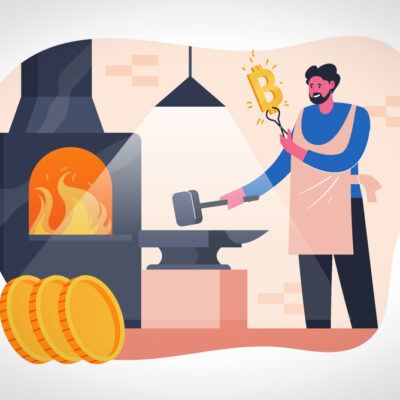





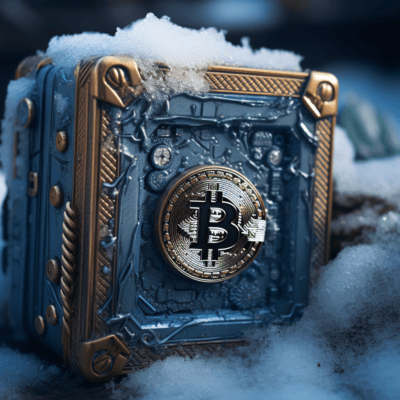

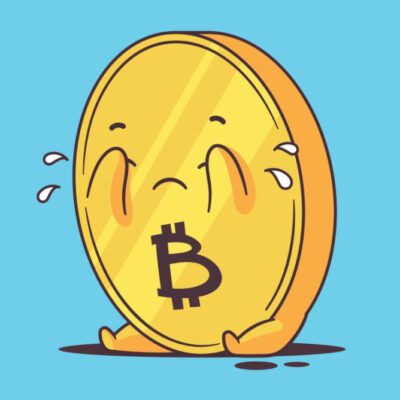



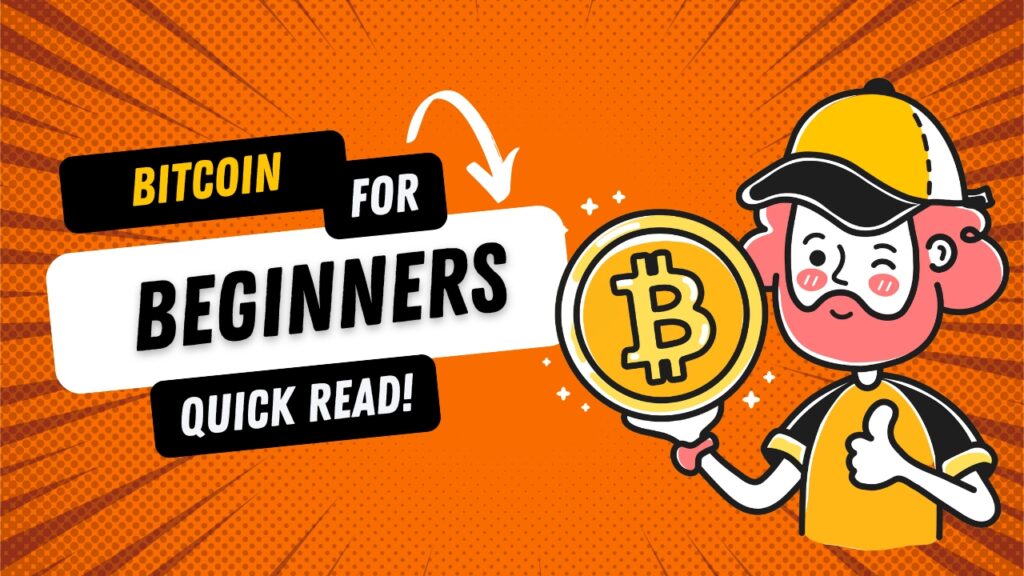
 55 Bitcoin Podcasts With Bitcoin-Only Content
55 Bitcoin Podcasts With Bitcoin-Only Content
Leave a Reply